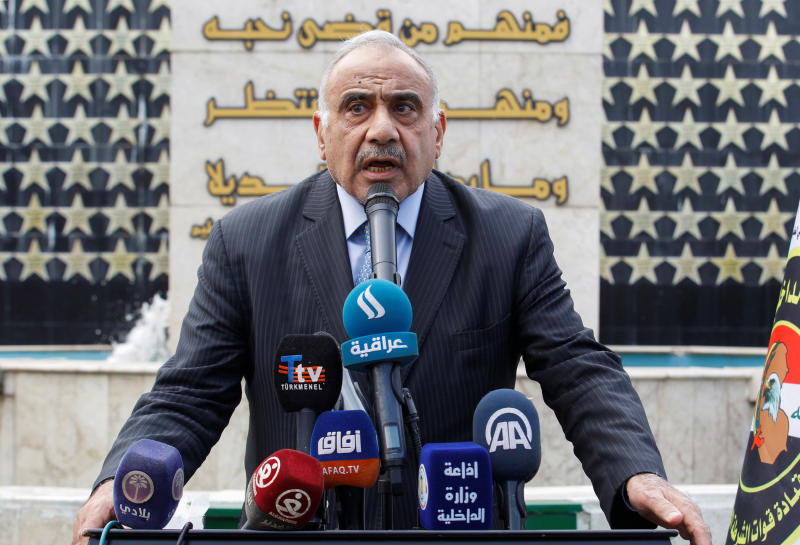Iraq rejects long-term presence of US troops withdrawing from Syria
Sign up now: Get ST's newsletters delivered to your inbox

Iraqi Prime Minister Adel Abdul Mahdi speaks during a symbolic funeral ceremony of Major General Ali al-Lami, who was killed in Salahuddin, on Oct 23, 2019.
PHOTO: REUTERS
Follow topic:
BAGHDAD (REUTERS) - Iraq on Wednesday (Oct 23) rejected any long-term presence of US forces that have crossed its border during a retreat from northern Syria, after visiting Defense Secretary Mark Esper initially indicated the troops would remain.
After meeting Esper, Prime Minister Adel Abdul Mahdi reiterated an earlier position that US troops being pulled out of Syria would be allowed only to transit Iraq and said none could stay in the country without permission.
In a statement, Abdul Mahdi said Iraq was "taking all international legal measures" to ensure the US troops would leave as required. He did not elaborate.
US forces have been deeply unpopular in much of Iraq since their 2003-2011 occupation of the country, though their support was instrumental in Baghdad dismantling Islamic State in Iraq and Syria's (ISIS') self-declared "caliphate" in 2017 after years of devastating war.
Esper had initially told reporters that troops leaving Syria would go to western Iraq for further operations against scattered ISIS militants and "help defend Iraq". But he appeared to row back on Tuesday, saying Washington aimed to eventually bring the troops home.
Abdul Mahdi's comments came in a wider statement that mainly addressed a wave of anti-government protests and were presented as a fulfilment of demands to safeguard Iraqi sovereignty.
His office later issued a second statement specifically on his meeting with Esper which bore a more diplomatic tone.
Esper told Abdul Mahdi that the United States respects Iraq's sovereignty and that US forces enter and leave Iraq with clearance from Baghdad, the statement said.
"The US forces withdrawing from Syria into Iraq enter and leave Iraqi territory with permission and approval from the Iraqi government, and any media reports of them staying in Iraq are not true," Abdul Mahdi's office quoted Esper as saying.
Esper also met on Wednesday Iraqi counterpart Najah al-Shammari. They discussed military cooperation and "consulted over the military events the region is going through," the Iraqi defence ministry said in a statement.
"As the Secretary said, the United States military is in Iraq at the invitation of the Iraqi government to confront Islamic State and to help ensure a sovereign and independent Iraq state," said a senior US defence official.
"Any movement of US troops out of Syria and through Iraq will take weeks, not days, and will be well-coordinated with, and have the approval of, the sovereign Iraq government. The planning for such effort is under way."
Iraq is one of the regional allies that has closely watched President Donald Trump's decision to abruptly withdraw troops from northern Syria and withhold protection from Kurdish fighters who had helped US troops fight ISIS.
Iraq still hosts a separate force of around 5,000 US troops involved in operations to neutralise ISIS. But it is also friendly with Washington's enemy Iran to the east.
Abdul Mahdi has faced a crisis over violent anti-corruption protests in recent weeks, leaving him with little political capital to spend defending ties with the United States.
"Iraqi politics are in a delicate state. There's no Iraqi support for the country becoming a principal US garrison in the Middle East," said Jon Alterman, Middle East expert at the Centre for Strategic and International Studies.

